Insights into new decree on direct power sale and purchase mechanism
The Vietnamese government issued Decree No. 80/2024/ND-CP on July 3 for a direct power sale and purchase agreement (DPPA) between renewable energy generators and large power consumers, which went into force on the same day. Senior partner Anh Dang and associate Tran Huong Giang at VILAF law firm, offer an insight into the long-anticipated decree.
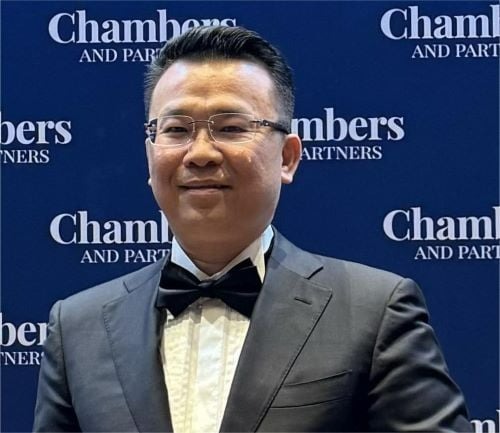
Anh Dang, senior partner at VILAF. Photo courtesy of the law firm.
Decree 80/2024 has fulfilled nearly decade-long public demand for clear guidelines on any DPPA entered into by large consumers, initially outlined in the Law on Electricity 2004.
It also marks a significant step towards developing key legislative initiatives within the 2023-2025 period for enhancing the Vietnamese energy industry sustainability, as outlined in the Prime Minister’s recent implementation plan for the National Power Development Plan 8.
Scope of application of Decree 80/2024
Decree 80/2024 introduces two models for the DPPA, i.e., (i) sale and purchase via private wire systems (Private Line Model) and (ii) sale and purchase via national grid systems (Grid Connected Model).
The stated two models are not available to all participants of the electricity market but limited to specific eligible entities as follows:
(i) Renewable energy generators (RE Generators), being entities that own power plants generating electricity from renewable sources (such as grounded and rooftop solar, wind, small hydropower, biomass, geothermal, tidal, marine), and hold electricity operating permits or are exempted from permit requirements;
(ii) Large power consumers (Large Consumers), being entities or individuals that procure electricity for their own consumption. These include those identified as “large power consumers” by the Ministry of Industry and Trade (MoIT), or those with actual or registered electricity consumption of at least 200,000 kWh per month;
(iii) Electricity retailers (Authorized Retailers), being electricity entities that (1) hold electricity retail permits in special zones, clusters with the electricity purchase volume of at least 200,000 kWh per month and connected at voltage levels of 22 kV or higher, and (2) are authorized by Large Consumers to purchase power from EVN and enter into forward contracts with RE Generators in the Grid Connected Model; and
(iv) EVN, the National Load Dispatch Center (NLDC), the Power Corporation, and other EVN entities.
Decree 80/2024 requests that RE Generators and Large Consumers must comply with provisions of laws on planning, investment (under responsibility of the owner of power generation plants, including compliance with the national power development plan and provincial planning approved by a competent authority); provisions of laws on issuance of electricity operation permits (under the responsibility of the owner of power generation plants); provisions of laws on power safety, fire and explosion prevention, and extinguishment in construction, land, environment protection, operation of electricity (power generating, transmission and distribution) and safety in use of power; provisions of laws on power sales, purchases, contracts, and other relevant provisions of laws.
DPPA under Private Line Model
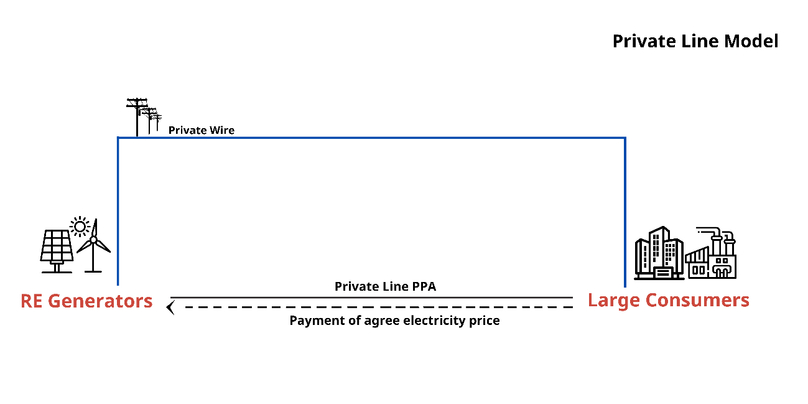
The Private Line Model involves executing a DPPA (Private Line PPA) and delivering power through a private line system between a RE Generator and a Large Consumer.
All RE Generators and Large Consumers are allowed to participate in the Private Line Model. No prior approval or registration is required for this model, but the Large Consumer must prepare and send a written report on its entering into the Private Line Model (attached with a copy of the Private Line PPA) to their provincial People’s Committee, EVN and NLDC.
Key considerations of this model include:
(i) The Private Line PPA must not comply with any statutory template and is subject to the parties’ agreement, but it must include mandatory contents outlined in Article 22 of the Law on Electricity and relevant regulations.
These contents cover the following: contract subjects; purposes of using electricity; standards and quality of services; rights and obligations of parties; electricity price, payment method and payment term; conditions for contract termination; liability for breach of contract; contract duration; responsibility for investment, construction, management, and operation of private wire; and other contents;
(ii) The electricity price is determined through negotiation and mutual agreement between the contracting parties; and
(iii) Participation in the Private Line Model does not restrict the RE Generators from selling electricity surplus to, or the Large Consumers from purchasing electricity from, ENV (or another authorized entity).

Tran Huong Giang, associate at VILAF law firm. Photo courtesy of the company.
DPPA under Grid Connected Model
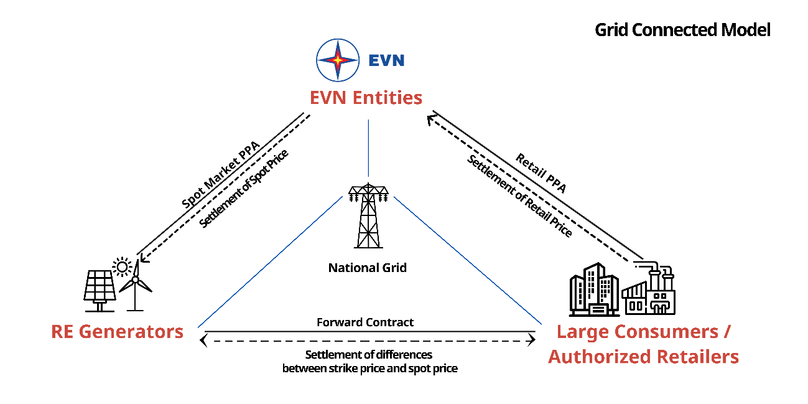
The Grid Connected Model entails three separate arrangements among RE Generators, EVN, and the Larger Consumers or Authorized Retailers. Details of each arrangement are discussed further below.
Unlike the Private Line Model, not all RE Generators and Large Consumers are eligible to the Grid Connected Model. Specifically, this model is accessible only to (i) RE Generators of solar or wind energy with an installed capacity of 10 MW or more, connected to the national grid, and directly participating in the competitive wholesale electricity market; and (ii) Large Consumers purchasing power from EVN (or another authorized entity) for manufacturing purposes and connected at voltages of 22 kV or higher.
The eligible RE Generators and the Large Consumers or Authorized Retailer wishing to engage in the Grid Connected Model must register with the NLDC for obtaining EVN’s confirmation on the possibility of executing this model.
Key arrangements for the Grid Connected Model include:
(i) The RE Generator to sell electricity on the spot market
- The RE Generator will enter into an agreement on power sale and purchase on the spot market with EVN (Spot Market PPA), which must adhere to the statutory template outlined in Annex I of Decree 80/2024; and
- Payment to the RE Generator (Spot Price) is calculated using the following formula:
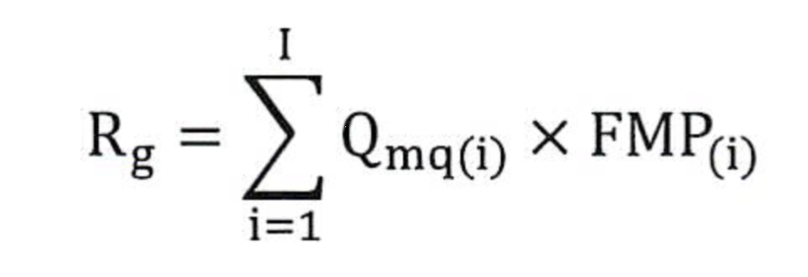
in which:
1. RG: Total market electricity payment during the payment cycle (VND);
2. Qmq(i): Measured electricity output of the RE Generator in transaction cycle i (kWh);
3. i: Transaction cycle number i within the payment cycle;
4. I: Total number of transaction cycles within the payment cycle; and
5. FMP(i): Spot electricity market price within the transaction cycle i (VND/kWh).
(ii) The Large Consumer or Authorized Retailer to purchase electricity from the Power Corporation
- The Large Consumer or Authorized Retailer will enter into a power purchase agreement with the Power Corporation (Retail PPA), which must adhere to the statutory template outlined in Annex II of Decree 80/2024.
- The electricity price payable by the Large Consumer or Authorized Retailer under the Retail PPA (Retail Price) for a specific payment cycle is calculated using the following formula:
CKH = CTTD + CBL
in which:
1. CKH: Total costs for power purchase (VND);
2. CTTD: Costs for power purchase in the electricity market (VND), determined as follows:
CTTD = CDN + CDPPA + CCL
in which:
(a) CDN: Electricity costs paid based on the electricity market price (VND), determined per the formula in Article 16.2 of Decree 80/2024;
(b) CDPPA: Costs for using electricity system services (VND), determined per the formula in Article 16.4 of Decree 80/2024; and
(c) CCL: Costs for offsetting differences (VND), determined per Annex IV of Decree 80/2024.
3. CBL: Costs for power purchase in each transaction cycle based on the retail electricity price in case where the electricity consumption volume of the Large Consumer or Authorized Retailer is higher than the output of RE Generator. Formula for determining this cost is specified in Article 16.1(c) of Decree 80/2024.
(iii) DPPA between the Large Consumer or Authorized Retailer and the RE Generators
- The RE Generator and the Large Consumer or Authorized Retailer will enter into a DPPA in the form of a forward contract (hợp đồng kỳ hạn in Vietnamese), which must contain mandatory contents specified in Annex III of Decree 80/2024.
- The electricity output and strike price of the forward contract are agreed by the parties for each transaction cycle on the spot market. The reference price is the spot price that is determined, and published according to the regulation on the wholesale electricity market issued by MoIT.
- The Large Consumer or Authorized Retailer will pay the RE Generator the difference between the strike price and the spot price, which is determined using the following formula:

in which:
1. RC: Revenue of the RE Generator under the forward contract in each transaction cycle (VND);
2. i: Transaction cycle number i within the payment cycle;
3. I: Total number of transaction cycles within the payment cycle;
4. Pc(i): Strike price agreed in the forward contract (VND/kWh);
5. FMP(i): Spot electricity market price within transaction cycle i (VND/kWh); and
6. Qc(i): Electricity output committed in the forward contract within transaction cycle I (kWh).
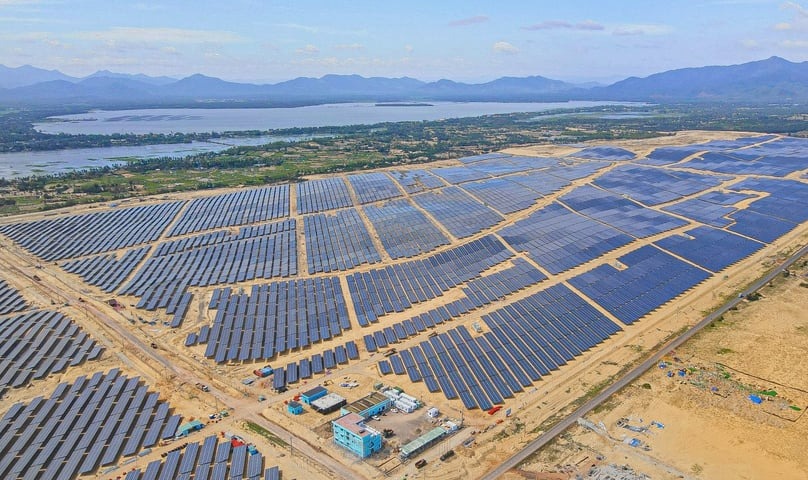
A solar farm in Binh Dinh province, central Vietnam. Photo courtesy of Bamboo Capital Group.
Responsibilities of EVN and its entities in DPPA under Grid Connected Model
In the DPPA mechanism, EVN and its entities have the following responsibilities:
(i) EVN shall be responsible for, inter alia, negotiating, executing the Spot Market PPA with RE Generators upon receiving their requests for the sale of power and relevant documents; calculating costs for using electricity system services per unit for year N and reporting to the MoIT;
(ii) NLDC shall be responsible for, inter alia, managing the registration for participation in the DPPA under the Grid Connected Model between RE Generators and Large Consumers; operating the electricity system and market according to prevailing regulations; publishing monthly the list of RE Generators and Large Consumers participating in the DPPA mechanism and their electricity output and consumption volume, respectively; inspecting, identifying, and reporting the MoIT of any violations during DPPA implementation; and
(iii) Power Corporations shall be responsible for, inter alia, negotiating, executing the Retail PPA with the Large Consumers participating in the DPPA mechanism within seven (07) business days upon receiving the full and valid application for power purchase from the Large Consumers; investing to install the electricity measurement systems (including main and backup measurement systems) and the remote data collection system at electricity metering points with the Large Consumers to facilitate the calculation and payment, unless otherwise agreed with the Large Consumers.
Temporary suspension, termination, and revival of DPPA mechanism
The MoIT Minister, based on reports and proposals of EVN, NLDC, or relevant authorities, shall decide on temporary suspension, termination, and revival of participation in the DPPA mechanism in specific cases as follows:
(i) Participation of RE Generators, Large Consumers or Authorized Retailers in the DPPA mechanism shall be temporarily suspended in cases where:
- The electricity market is suspended in accordance with the Regulation on the wholesale electricity market issued by the MoIT;
- One of the agreements in the DPPA mechanism is suspended or expires, affecting relevant parties’ interests;
- There are activities to exploit mechanisms and policies for illicit gains; or
- Consumers that have participated in the DPPA mechanism but now having an average electricity consumption (average in 12 consecutive months) of less than 200,000 kWh per month.
In case of temporary suspension, the Large Consumers will purchase electricity and make payment according to the retail tariff prescribed by the MoIT, the Authorized Retailers will purchase electricity from the Power Corporation according to the existing electricity tariff, and the RE Generators will negotiate and agree with EVN on the sale of power to EVN (or another authorized entity) at a generation price within the renewable energy price bracket issued by the MoIT or other applicable pricing mechanisms.
(ii) Participation in the DPPA mechanism shall be revived upon confirmation by competent authorities that violations leading to suspension have been resolved or upon decision to resume electricity market operations. In case of revival, relevant entities shall be responsible for continuing to implement executed power purchase sale and purchase agreements.
The MoIT shall decide on termination of participation in the DPPA mechanism in the following cases upon obtaining written opinions from relevant authorities: (i) the existing participants of the DPPA mechanism request for a voluntary termination; or (ii) there are activities to exploit mechanisms and policies for illicit gains within consequences that cannot be remedied. In case of termination, RE Generators, Large Consumers, Authorized Retailers, and Power Corporations must negotiate and execute the PPAs per prevailing regulations.
Challenges and outlooks
While Decree 80/2024 has laid down a robust legal framework for direct power purchases, certain provisions remain ambiguous. For example, provisions concerning the costs for using electricity system services payable to EVN under the Grid Connected Model are broadly stated and lack detailed calculation and payment procedures.
Additionally, Article 27 (as mentioned above) allows for the temporary suspension or termination of a DPPA in cases where there are “activities to exploit mechanisms and policies for illicit gains”, yet clear criteria for identifying such activities are not specified.
During a conference on Decree 80/2024 held on July 5, MoIT Minister Nguyen Hong Dien urged the MoIT and EVN to promptly issue detailed implementation guidelines for Decree 80/2024 to effectively safeguard the rights of private stakeholders participating in direct power purchase mechanisms.
Moreover, delays in upgrading transmission infrastructure and persistent grid congestion remain significant challenges for the efficient realization of the direct power purchase mechanism, particularly under the Grid Connected Model.
Despite those challenges, Decree 80/2024 will play a crucial role in driving Vietnam’s green transition and advancing towards its target of achieving net zero emissions by 2050. Moreover, it provides significant advantages to large manufacturers and enterprises operating in industrial and economic zones, which will become the cornerstone of the Vietnamese economy.
- Read More
Vingroup plans $38 mln bond issuance to restructure debt
Vingroup (HoSE: VIC), Vietnam’s largest listed company by market cap, plans to issue VND1 trillion ($37.91 million) in bonds via private placement as it seeks to restructure debt.
Companies - Tue, November 25, 2025 | 3:52 pm GMT+7
Vietnam gov't proposes minimum $379 mln charter capital for offshore wind developers
The Vietnamese government has proposed that offshore wind power developers have a minimum charter capital of VND10 trillion ($379 million) each, according to a draft resolution designed to ease bottlenecks in the country’s 2026-2030 energy development plan.
Energy - Tue, November 25, 2025 | 3:41 pm GMT+7
Petrovietnam arm to venture into CO2 transportation, seabed minerals, geothermal
PVEP, the upstream arm of state giant Petrovietnam, plans to expand into new fields such as CO2 transportation and disposal (carbon capture, utilization, and storage), coal gas and underground mineral research, seabed minerals, and geothermal.
Industries - Tue, November 25, 2025 | 3:08 pm GMT+7
MB successfully closes landmark $500 mln inaugural green term loan facility agreement
Military Commercial Joint Stock Bank (MB) on Monday announced the successful closing of its three-year $500 million inaugural Green Term Loan Facility Agreement, marking a significant milestone in the bank’s sustainable financing journey.
Banking - Tue, November 25, 2025 | 2:17 pm GMT+7
Impact of rising exchange rates in Vietnam
Mirae Asset Securities analysts offer an insight into the impact of rising exchange rates on companies in Vietnam in a report dated November 21.
Economy - Tue, November 25, 2025 | 1:35 pm GMT+7
Vietnam's industrial park developers post strong earnings as tenant demand rebounds
Vietnam’s industrial real estate sector is showing stronger earnings and improving demand, with foreign tenants resuming lease negotiations after U.S. tariff policies became clearer, according to a brokerage report.
Industrial real estate - Tue, November 25, 2025 | 11:07 am GMT+7
Vietnamese export stocks under the radar despite strong earnings
Investor caution over tariff risks and the slowdown of major economies has prevented Vietnamese export stocks from making a strong price recovery.
Finance - Tue, November 25, 2025 | 8:44 am GMT+7
Indonesia plans 7 initial waste-to-energy plants next year
Indonesia will start the construction of seven waste-to-energy power plants in 2026 as the first step to develop 33 such facilities by 2029.
Southeast Asia - Mon, November 24, 2025 | 9:23 pm GMT+7
Malaysia predicted to be ASEAN’s second-fastest-growing economy, after Vietnam
Malaysia is poised to become the second-fastest-growing economy in the Association of Southeast Asian Nations (ASEAN) after Vietnam, data showed.
Southeast Asia - Mon, November 24, 2025 | 9:19 pm GMT+7
Thailand SCG-backed Bien Hoa Packaging plans delisting from HCMC bourse
Bien Hoa Packaging JSC, a 57-year-old manufacturer in Vietnam, plans to scrap its public-company status and delist from the Ho Chi Minh Stock Exchange (HoSE) as its free float fell below the minimum threshold under local securities law.
Companies - Mon, November 24, 2025 | 9:06 pm GMT+7
Real estate, industrials sectors lead in October M&A value in Vietnam
Grant Thornton analysts provide an insight to capital flows, the sectors attracting investor attention, and the market dynamics influencing the merger and acquisition (M&A) landscape in Vietnam in October.
Economy - Mon, November 24, 2025 | 4:39 pm GMT+7
Tobacco giant Vinataba to sell entire stake in instant noodle maker Colusa-Miliket
State-owned Vietnam National Tobacco Corporation (Vinataba) plans to divest its entire 20% stake in Colusa-Miliket, the company behind the iconic “Miliket” (two-shrimp) instant noodle brand, seeking to raise at least VND114 billion ($4.32 million).
Companies - Mon, November 24, 2025 | 4:10 pm GMT+7
VinSpeed cannot participate in North-South high-speed rail project under PPP model: exec
Pham Nhat Vuong, founder of VinSpeed High-Speed Rail Investment and Development JSC, has mapped out a clear 30-year financing plan for the gigantic North-South high-speed rail project, said an executive at Vingroup, a VinSpeed investor.
Infrastructure - Mon, November 24, 2025 | 3:51 pm GMT+7
Delivery major Viettel Post plans $21 mln logistics center in central Vietnam
Viettel Post, the courier arm of military-run telecom giant Viettel, has completed a site survey for a planned 21-hectare logistics center in the central province of Ha Tinh, with an estimated investment of nearly VND550 billion ($20.87 million).
Industries - Mon, November 24, 2025 | 11:49 am GMT+7
Honda Mobilityland eyes 600-ha sports, entertainment, tourism complex in southern Vietnam
Honda Mobilityland Corporation, a subsidiary of Japan’s Honda Motor Co., plans to build an international circuit in Tay Ninh province, towards developing a 600-hectare sports, entertainment, and tourism complex there.
Industries - Mon, November 24, 2025 | 11:23 am GMT+7
State-controlled shipping line Vosco steps up coal trading to seek new revenue drive
Vietnam Ocean Shipping JSC (Vosco), controlled by the state-run Vietnam Maritime Corporation, is moving deeper into coal trading as the shipping line increasingly bids for large import contracts for thermal power plants, marking a push beyond its core maritime transport business.
Companies - Mon, November 24, 2025 | 8:36 am GMT+7

























